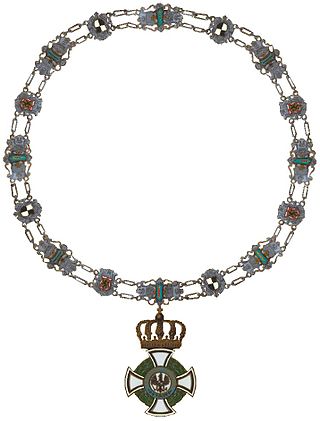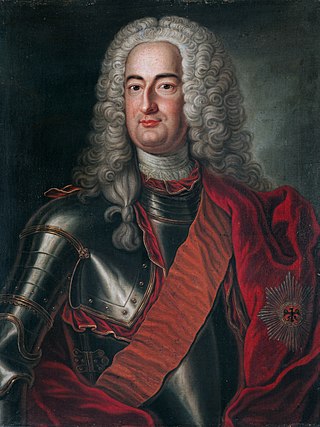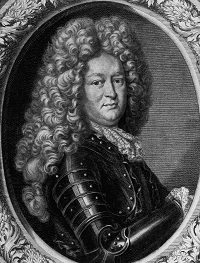
Gustav Ernst Stresemann was a German statesman who served as chancellor of Germany from August to November 1923, and as foreign minister from 1923 to 1929. His most notable achievement was the reconciliation between Germany and France, for which he and French Prime Minister Aristide Briand received the Nobel Peace Prize in 1926. During a period of political instability and fragile, short-lived governments, Stresemann was the most influential politician in most of the Weimar Republic's existence.

Chlodwig Carl Viktor, Prince of Hohenlohe-Schillingsfürst, Prince of Ratibor and Corvey, usually referred to as the Prince of Hohenlohe, was a German statesman, who served as the chancellor of the German Empire and minister-president of Prussia from 1894 to 1900. Prior to his appointment as Chancellor, he had served in a number of other positions, including as minister-president of Bavaria (1866–1870), German Ambassador to Paris (1873–1880), Foreign Secretary (1880) and Imperial Lieutenant of Alsace-Lorraine (1885–1894). He was regarded as one of the most prominent liberal politicians of his time in Germany.

Frederick Louis, Prince of Hohenlohe-Ingelfingen was a Prussian general.

Hohenlohe-Langenburg was a German county and later principality in the Holy Roman Empire. It was located around Langenburg in what is now northeastern Baden-Württemberg, Germany. Starting in medieval times and continuing until 1806, this small state was ruled by a branch of the House of Hohenlohe, first as lords, then as counts and ultimately as ruling princes of the Holy Roman Empire after 1764. The princely House of Hohenlohe-Langenburg still owns and lives in Langenburg Castle today.

The House of Hohenlohe is a German princely dynasty. It formerly ruled an immediate territory within the Holy Roman Empire, which was divided between several branches. In 1806, the area of Hohenlohe was 1,760 km² and its estimated population was 108,000. The motto of the house is Ex flammis orior. The Lords of Hohenlohe were elevated to the rank of Imperial Counts in 1450, and from 1744, the territory and its rulers were princely. In 1825, the German Confederation recognized the right of all members of the house to be styled as Serene Highness, with the title of Fürst for the heads of its branches, and the title of prince/princess for the other members. From 1861, the Hohenlohe-Öhringen branch was also of ducal status as dukes of Ujest.

Wolfgang Gert Stresemann was a German jurist, orchestra leader, conductor and composer. He was the intendant of the Berliner Philharmoniker from 1959 to 1978 and again from mid 1984 to early 1985, a time when Herbert von Karajan served as music director.

The House Order of Hohenzollern was a dynastic order of knighthood of the House of Hohenzollern awarded to military commissioned officers and civilians of comparable status. Associated with the various versions of the order were crosses and medals which could be awarded to lower-ranking soldiers and civilians.

Leopold IV, Prince of Lippe was the final sovereign of the Principality of Lippe in northwestern Germany from 1905 until his abdication in 1918. Prior to succeeding to the throne, he had been governing the state since 1904 as regent. He was the first and only ruler of Lippe of the Lippe-Biesterfeld branch.

Albrecht Wolfgang, Count of Schaumburg-Lippe was a ruler of the County of Schaumburg-Lippe.

The Friedrich Order was an order of merit of the German Kingdom of Württemberg. It was instituted on 1 January 1830 by the second king of Württemberg, Wilhelm I in remembrance of his father, King Friedrich I. In 1918, the end of the monarchy meant the abolition of the order.
Events in the year 1899 in Germany.
Events in the year 1904 in Germany.

Käte Stresemann was the wife of the German Chancellor, Foreign Minister and Nobel Peace Prize laureate Gustav Stresemann. Widely admired for her elegance and intelligence, she was a prominent figure of society in the 1920s. As the wife of the foreign minister she made her salon at Tauentzienstraße 12a a meeting place of diplomats.

Victor II, Duke of Ratibor, Prince of Corvey, Prince of Hohenlohe-Schillingsfürst was a member of the House of Hohenlohe-Schillingsfürst and Duke of the Silesian duchy of Ratibor.

Louis Crato, Count of Nassau-Saarbrücken was a German aristocrat and soldier who succeeded his father as Count of Nassau-Saarbrücken.

Karl Ludwig, 3rd Prince of Hohenlohe-Langenburg was the third Prince of Hohenlohe-Langenburg. He was the first child of Prince Christian Albert of Hohenlohe-Langenburg and his wife, Princess Caroline of Stolberg-Gedern.
Events in the year 1895 in Germany.
Events in the year 1886 in Germany.
Hans Friedrich Wilhem Ernst von Raumer was a German politician of the German People's Party (DVP). He served as minister in two governments of the Weimar Republic and was also active as a representative of German industry.

Günther Friedrich Karl II of Schwarzburg-Sondershausen was the ruling Prince of Schwarzburg-Sondershausen following his father's abdication in 1835 until his own abdication in 1880. After Schwarzburg-Sondershausen joined the North German Confederation, he joined the Royal Prussian Army, and in 1879 became General of the Infantry.















